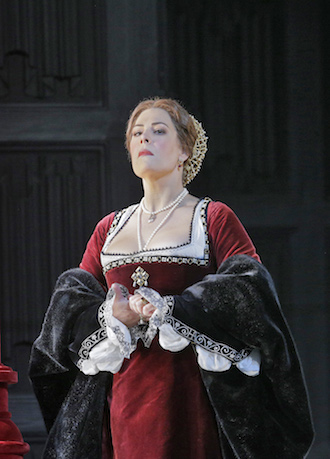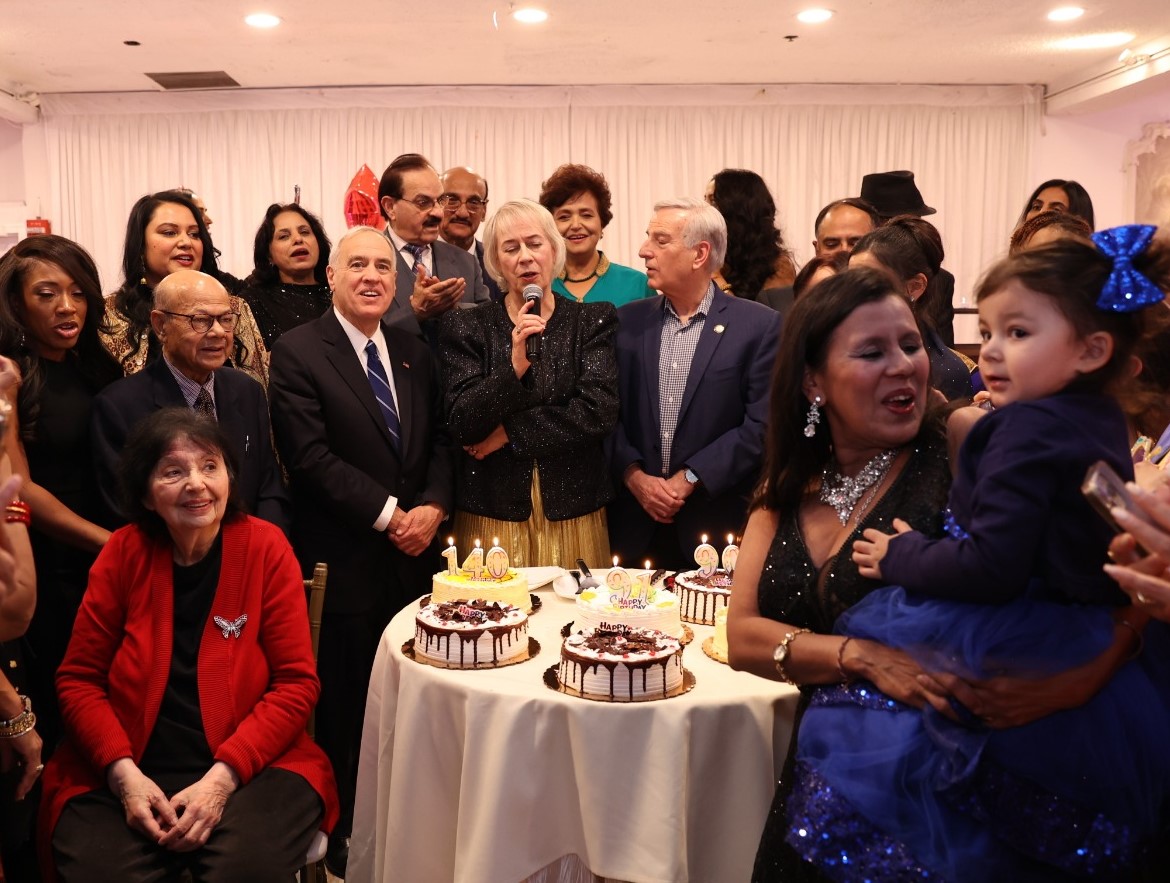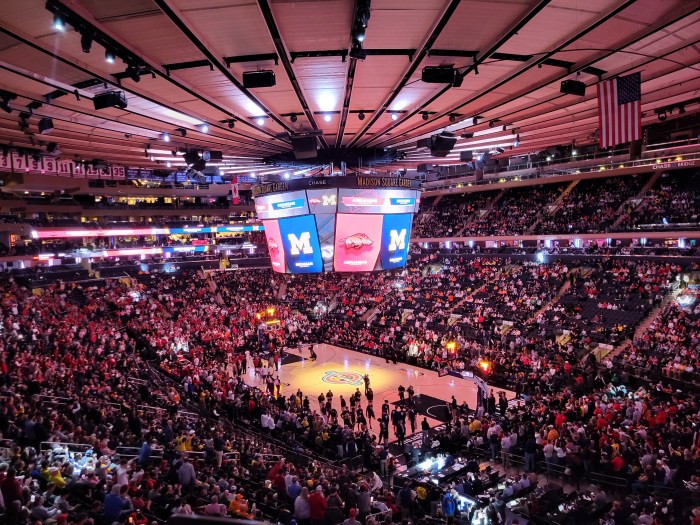
BY DAVID SHENGOLD | Sondra Radvanovsky — one of the world’s most ambitious sopranos and, in the right roles, one of the most capable — has embarked on a huge project this Met season. Setting aside the weightier Verdi scores in which she’s pretty close to matchless today — “Ernani,” “Un ballo in maschera,” “I vespri siciliani” — Radvanovsky is going for a trifecta of Donizetti Tudor queen roles. These will be Anne (“Wolf Hall”) Boleyn, mother of Elizabeth I; Mary Stuart, Elizabeth’s Scottish cousin and rival; and Elizabeth herself in old age, trying to keep a hold on her straying, much younger lover, Robert Devereux.
In New York, the three roles as a hat trick are associated with Beverly Sills, who performed them all at City Opera in the early ‘70s. In fact, Donizetti penned the relevant operas (“Anna Bolena,” “Maria Stuarda,” and “Roberto Devereux”) at different times, for different singers, and never intended them as a trilogy. Tudors were as much in style in Romantic 19th century Europe as in our days of soft-core cable TV historical bodice-rippers.
Other sopranos from Montserrat Caballé through Carol Vaness and Mariella Devia have offered some of the iconic roles locally in concert performances; and still others (Olivia Stapp in “Bolena,” Ashley Putnam in “Stuarda,” Lauren Flanigan in “Devereux”) followed Sills onto the NYCO stage. The Metropolitan under James Levine’s musical directorship had been but little interested in serious bel canto operas: the company has neglected “Lucrezia Borgia” since 1904, “Guillaume Tell” since 1931, and has never presented “Tancredi” or “Capuleti” at all.
Peter Gelb sagely decided to stage the three very valid Tudor queen operas, hoping initially to present Anna Netrebko in each of them over several seasons. The Russian diva — sometimes capably spelled by Angela Meade — introduced The Boleyn Woman with flair and darkly beautiful sound, if with varying success in regard to pitch and declamation. The Queen of Scots took on a very different luster in Joyce DiDonato’s riveting, deeply spiritual impersonation — wonderfully stylish but in places altered as to keys, as with other mezzos essaying the role. Radvanovsky tried out the “Devereux” Elizabeth in Toronto last year in the staging that will augment the other two this season at the Met: a bravely un-vain impersonation in exciting sound and showing considerable feeling, yet — the usual cavil that attends most of her performances — with too little made of the sung words.
All three productions are directed by David McVicar, whose design choices run to murkily lit black, gray, and red, with the women in lavish costumes, and male semi-nudity when possible. Might this last constitute an attendance selling point for wavering friends?
The season opener of “Anna Bolena” the afternoon of September 26 never quite broke through the attendant gloom dramatically, partly due to Marco Armiliato’s somewhat hangdog manner in the pit. He cut the overture (!) and allowed singers long “cut outs” before yelled final high notes — a kind of provincial 1970s bel canto “style” long discredited.
Radvanovsky throwing in countless high interpolations furthered this impression. Three or four of them proved thrilling and apt; the rest, including a misfired final high E flat, focused attention on her shortcomings. Her voice’s decibel impact is part of her arsenal, but here she sounded best when reining it in. Full-voiced sallies sometimes betrayed gear changing. Her Anna proved touching at moments but was too episodically acted to be maximally moving. Again, some of this is a failure to shape the text into meaningfully projected lines. The ballad-like “Al dolce guidami” really hit home, and showed what this impersonation might become.
Jamie Barton, an excellent young mezzo, appeared as Jane (“Giovanna”) Seymour; worshipful press puffery had prepped the audience for an unalloyed triumph, but her initial performance wasn’t quite a match for her recent Adalgisa, a triumph indeed. Barton boasts a rich timbre and technical savvy, though on this occasion her downward scales were less even than Radvanovsky’s, and the top notes, though easily there, lost a little quality. Yet Barton is always well worth hearing, and both divas — who did well as it is by their great central duet — will doubtless bring smoother game to later performances.
The pivotal role of Percy — Anna’s former suitor and, apparently, pledged spouse, an ardent if dim-witted soul easily manipulated by Henry to work her destruction — again fell to Stephen Costello. The Philadelphia tenor, a handsome but awkward stage actor, once more proved a mixed bag. His burnished middle voice has the right timbre for the role, and the projected cluelessness seemed more part of a characterization, less a performer’s inexperience. Yet — another indication that Armiliato is not the best steward for these Donizetti scores — Percy’s scenes were both cut to ribbons to reduce the challenges, and even then Costello had to rewrite high-lying passages downwards and leave things out. One backstage source told me that Costello was ill, and that might be so; but why was no announcement made, and why did they not send on his capable alternate, Taylor Stayton — who eventually did take on the second show?
Ildar Abdrazakov looks terrific as Henry VIII, channeling the right mixture of sexiness, capriciousness, and repulsive egotism. He handles the Italian “ottocento” style quite capably, which mitigates the fact that his voice is neither large nor dark enough for the part. “Enrico” has no aria, but his music can be impactful in ensembles, as Samuel Ramey showed lavishly at City Opera. Tamara Mumford remained as Smeton, the smitten teenage musician that ends up betraying Anna (and whom she in turn accuses Henry of seducing, though McVicar chooses not to go there in the subtitling). Mumford as always showed an arresting personal timbre, musically used.
David Crawford, heavily favored by the casting department these days, sounded characteristically rough and undistinguished as Anna’s brother Rochefort — also accused of being her lover. In the penultimate prison scene, in which Rochefort agrees to die alongside the condemned Percy, both Crawford and Costello sported bare legs and what looked like bloomer underwear, as if they had wandered in from some post-Raphaelite bro crew team fantasy.
Donizetti’s Tudor works compel attention, however variably… um, executed; try to catch them this season.
David Shengold (shengold@yahoo.com) writes about opera for many venues.
































